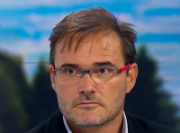In a study conducted by the University of Applied Sciences and Arts Western Switzerland Valais-Wallis (HES-SO), just 22% of Swiss tourism organizations have a data management strategy. Yet, within the travel industry, reservations and data collection are almost exclusively online.
Whether it's a hotel on Booking.com, a restaurant from TripAdvisor, or a beautiful beach found on Instagram, vacations nowadays are mostly planned online. Travel companies are well aware of this and are moving into digital, although they don't necessarily have the required competencies themselves. Manu Broccard, professor of marketing and tourism at the University of Applied Sciences Western Switzerland Valais-Wallis (HES-SO), discusses the implications of the digital shift in this sector.
What is the impact of digitization on the travel industry?
Manu Broccard: The impact of digital technology is felt in all walks of life and is of particular importance to the economy. The biggest difference between tourism and other businesses is in the emotional impact it generates. This is an industry that sells dreams. Through images or videos, digital technology can transmit impressions quickly and directly. Customers can easily relate to what they see on the internet. Digital technology offers a wealth of opportunities that must be taken advantage of by the travel industry.
What challenges are related to digitalization?
Broccard: There are a lot of them because much remains to be done in the management of digital data and the collection of customer data. There is still room for improvement in customer digitalization services, such as site visits: I’m talking about virtual or augmented reality for museums and other indoor activities. Regarding other distribution channels, for example for reservations, not all services are accessible digitally or via the Internet, despite the fact that today, the majority of the travel industry is made up of platforms such as Booking.com or Airbnb.
How can SMEs and professionals develop an effective online marketing strategy?
Broccard: An effective digital strategy is as important for travel companies as it is for other businesses. First, they will need to acquire access to certain media in order to manage the relevant information. By "media", I mean having a website or a blog. Second, I would recommend that they communicate their information and message in clear terms. With those in place, they can then tackle the management of social networks and their user community. Websites, blogs, paid advertisements and social network posts are all designed to provide consumers with accurate information. Ideally, this will convert visits or clicks into purchases.
What key points should be followed in order to develop an effective marketing strategy?
Broccard: One important consideration is managing search engine presence. As many as 93% of potential customers use search engines such as Google to find their way to a website. Using the right keywords will ensure that your website appears at the top of search results, thus providing you with an effective marketing strategy. I also recommend the diversification of your activities by using different networks, updating your website or your blog and interacting with your online community. Paid advertising is then the next step in the process.
What are the latest trends?
Broccard: Emotions and experience are buzzwords. These concepts were implicitly promoted in traditional marketing by displaying idyllic landscapes or entertaining activities. With the new technology, we try to implement them more concretely. TikTok is a good example: it has become a success thanks to the emotions it is able to convey through videos. Today, most tourist destinations already use this network.
Which are the key concerns of SMEs working in the tourism sector?
Broccard: The digital domain is new and not everyone is able to implement digital strategy without help or training. Today, many companies choose to hire online community managers who are skilled in managing websites, writing texts in several languages, running Google or social media campaigns and maintaining close links with the online community.
Are digital and traditional methods of marketing compatible?
Broccard: The two are complementary. Traditional media, such as newspapers, radio and television, remain as effective in conveying images and messages. If a travel company only relies on digital media, it could also be missing out on certain target customers. In marketing, message repetition is important. Seeing an ad in a digital medium and then on a poster in the street is positive reinforcement. Depending on a company's financial resources, the joint implementation of both digital and traditional marketing campaigns provides the strengths and advantages of both.






